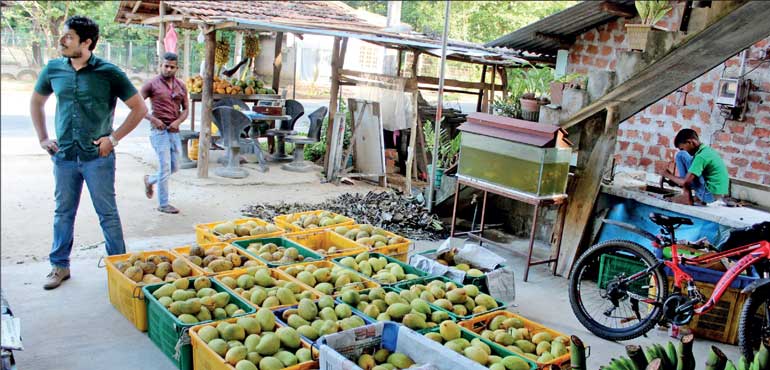Tuesday Feb 17, 2026
Tuesday Feb 17, 2026
Wednesday, 24 January 2024 00:25 - - {{hitsCtrl.values.hits}}

Some rural sellers continued to encounter delivery issues due to gaps in the availability of fast and reliable logistics services in remote areas
 Across the globe, e-commerce has emerged as a powerful engine of economic growth, job creation, innovation and trade integration. Research by the World Bank suggests that ‘e-commerce can flourish in developing countries and in rural areas and be a powerful instrument to create employment for semi-skilled workers, women and other groups.’ Correspondingly, the usage of e-commerce in Sri Lanka also appears to be gaining traction, with a recent report published in 20231 revealing that e-commerce is already an ‘island wide phenomenon’ in Sri Lanka, with over 50% of the survey respondents in all provinces affirming their use of e-commerce to purchase goods and services.
Across the globe, e-commerce has emerged as a powerful engine of economic growth, job creation, innovation and trade integration. Research by the World Bank suggests that ‘e-commerce can flourish in developing countries and in rural areas and be a powerful instrument to create employment for semi-skilled workers, women and other groups.’ Correspondingly, the usage of e-commerce in Sri Lanka also appears to be gaining traction, with a recent report published in 20231 revealing that e-commerce is already an ‘island wide phenomenon’ in Sri Lanka, with over 50% of the survey respondents in all provinces affirming their use of e-commerce to purchase goods and services.
Recognising the potential of e-commerce to be a driver for inclusive development, helping with income generation and bridging urban-rural divides, an outreach program was launched in August 2022 by a leading e-commerce platform in South Asia with the Government of Sri Lanka. The aim of the program was to connect rural producers and sellers (particularly local artisans and skilled handicrafters) to the digital economy through platform technology and provide them with the skills and tools they need to successfully tap into the e-commerce industry and start earning an income online.
When commencing the project several baseline assumptions were made regarding the operating environment and the intended beneficiaries. However, throughout the implementation of the program, several lessons were learnt that both refuted and confirmed these initial assumptions. Exploring the insights gained offers a significant opportunity for other institutions contemplating similar programs or interventions, with the aim of ensuring a more informed and adaptive approach that can successfully bridge the urban and rural digital divide in Sri Lanka.
Assumptions and corresponding findings
Assumption 1: Many sellers have a foundational grasp and familiarity with the e-commerce sector
At the outset, it was assumed that most rural producers and sellers would have limited awareness about the e-commerce sector and how it operates. However, once the program was launched it became apparent that many sellers possessed prior knowledge of the e-commerce industry and were also acquainted with platform technology, like Amazon, eBay and Daraz.
Assumption 2: Rural micro, small and medium enterprises (MSMEs) struggle to identify and access addressable markets
It was anticipated that many sellers would face difficulties in expanding their customer base or identifying an addressable market, and this assumption held true. Many sellers indicated they faced challenges due to limited information on accessible markets and heavy reliance on lengthy supply chains riddled with multiple intermediaries and logistics obstacles. Sellers were keen on establishing direct access to customers through e-commerce and appreciated the business-to-consumer and consumer-to-consumer models offered by e-commerce. However, some rural sellers continued to encounter delivery issues due to gaps in the availability of fast and reliable logistics services in remote areas. These sellers struggled to coordinate package pickups within their immediate locality or had to cover significant distances to reach the designated drop-off points for packages.
Assumption 3: Possession of a smartphone equates to possessing the basic digital literacy skills required for e-commerce
 When launching the program, it was assumed that possessing a smartphone implied a basic level of digital literacy among its owners. Yet, as the program unfolded, a stark reality emerged. While a majority of sellers used smartphones, a significant number struggled to harness technology effectively for e-commerce due to their limited digital proficiency. Even with the benefit of personalised training and assistance, some sellers struggled to independently navigate the Daraz Seller Centre application, for example, and complete simple but essential tasks such as uploading product photos and monitoring incoming orders. Some sellers even faced difficulties during the onboarding process, because they either didn’t have an email address or lacked sufficient typing skills.
When launching the program, it was assumed that possessing a smartphone implied a basic level of digital literacy among its owners. Yet, as the program unfolded, a stark reality emerged. While a majority of sellers used smartphones, a significant number struggled to harness technology effectively for e-commerce due to their limited digital proficiency. Even with the benefit of personalised training and assistance, some sellers struggled to independently navigate the Daraz Seller Centre application, for example, and complete simple but essential tasks such as uploading product photos and monitoring incoming orders. Some sellers even faced difficulties during the onboarding process, because they either didn’t have an email address or lacked sufficient typing skills.
Assumption 4: Sellers will understand that engaging in e-commerce involves continuous learning and the ability to be agile and proactively identify and cater to market trends
The prevailing assumption was that once sellers were integrated into an online marketplace and had completed their training, they would independently operate their e-commerce stores, while understanding the trends and nuances of e-commerce and continuously innovating. However, during the execution of the program, this assumption did not hold. For instance, some sellers expected rapid success without recognising the time needed to cultivate customer trust through positive ratings and reviews, an essential component of driving increasing online sales. Others overlooked the learning curve inherent in e-commerce, failing to comprehend the breadth of industry-relevant skills – such as digital marketing and product photography skills – they would need to cultivate to grow their business and capture more consumers across the island.
Recommendations for similar future initiatives
Based on the above learnings, the following recommendations can be considered by stakeholders implementing strategic initiatives to bridge the urban-rural digital divide and leverage the full potential of e-commerce.
The above lessons and recommendations can inform and enhance further policy and programmatic interventions designed to bridge the urban-rural gap in e-commerce. Indeed, to truly harness the transformative power of e-commerce for rural sellers in Sri Lanka, a synergistic effort by stakeholders from across the Government, the private sector, and non-governmental organisations is essential to harnessing the transformative power of e-commerce, with the aim of fostering inclusive economic growth and sustainable development in Sri Lanka.
Footnote:
1‘E-commerce: A driver of Incl-usive Growth in Sri Lanka?’ published by Daraz and SLASSCOM in 2023.
(The writer currently serves as the Public Policy Programs Manager at Daraz and supported the implementation of the Daraz Connect program. Formerly, she worked as a Policy and Engagement Associate at the UNDP Sri Lanka and holds an LLB from King’s College London.)